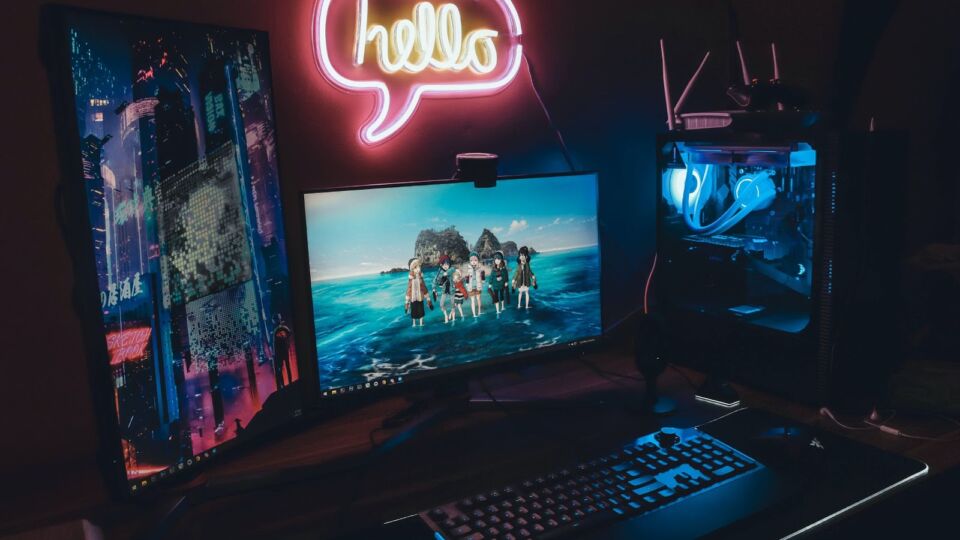Thinking of getting a gaming PC, but horrified at the ocean of confusing component names and acronyms? Here’s a very basic guide (with examples that those of us who don’t speak fluent tech geek will understand) to some of the big choices you’ll need to make. (And if you find yourself still going wtf even after this article, we’ve got an easy “shortcut” at the end that’ll make your PC-shopping journey a breeze).
Central processing unit (CPU)
To put it simply, the CPU is your computer’s brain. The more powerful its brain, the faster your computer can calculate and perform complex tasks like gaming and content creation. You will hear the words “cores”, “threads”, and “clock speed” thrown around a lot when shopping for CPUs. Cores and threads help your CPU work on multiple tasks at the same time.
Many games don’t use more than four-to-six CPU cores, so if you spend thousands on a 64-core monster CPU, a lot of that money goes to waste. Similarly, clock speed (represented in gigahertz or GHz) is how fast your CPU can process tasks. For gaming, we’d say the sweet spot is around 3.5 to 4.0 GHz.
Solid state drive (SSD) and hard disk drive (HDD) — or, storage
Solid state drives are newer, and more expensive, technology. They have no moving parts, so data can be written and read at blazing speed. This means your games, programs, and computer will load much faster (it’s highly recommended for this purpose). The downside is the high expense compared to HDDs.
Hard disk drives are older technology. The “disk” part of the name refers to a mechanical disk inside. Like a record player, a small arm sweeps across the disk to read and write data. This process is slower than a solid state drive, but HDDs are much cheaper. These are good for storing large amounts of files like music, photos, and documents.
Random access memory (RAM)
Even the mighty SSD is too slow for some of your computer’s memory needs. That’s where RAM comes into play. RAM is short-term, but extremely fast memory. Programs and games will use RAM to write data temporarily and recall it very quickly. Video games are notorious RAM hoarders (Google Chrome, too!), with many modern games requiring 16GB to run at their best. The speed of RAM is shown in megahertz (MHz); the amount of MHz needed will depend on your purposes, so make sure to read the recommended specifications of your chosen application. Meanwhile, AFTERSHOCK PC’s products (including their ready-to-ship stock) also contain the option of selecting the newer and improved DDR5 RAM, which can offer up to twice the effective bandwidth in comparison to its predecessor DDR4, therefore offering faster, better performance.
Graphics card (or Graphics Processing Unit, the GPU)
For gaming, this is your most important component, even more than the CPU. This is where a lot of gamers spend a huge portion of their budget, but beware of the internet hype. It’s very easy to overspend on a graphics card that isn’t optimized to your needs. The best choice for you will vary widely, so dedicate research time to this before you double down. Look at the games you want to play and their recommended vs minimum requirements. The website PCGameBenchmark is a great resource for this.
Cooling system
When your CPU does work, it gets hot — very hot. To avoid heat damage to the CPU, coolers are attached to draw heat away and push it out of the computer. There are air coolers and liquid coolers. Liquid coolers are more effective and for a lot of gamers add a cool aesthetic to their builds — but they have many moving parts and can be prone to failure. Air coolers don’t look as cool but in the overwhelming majority of cases they function just as well for your average gamer.
These are just a handful of options that can be customized when you build your new desktop or workstation (or even laptop) through AFTERSHOCK PC. Still have questions? AFTERSHOCK PC’s friendly support team is also more than happy to walk you through each step so that the PC that ultimately arrives at your doorstep is everything your competitive little gaming heart could dream of — and more.





